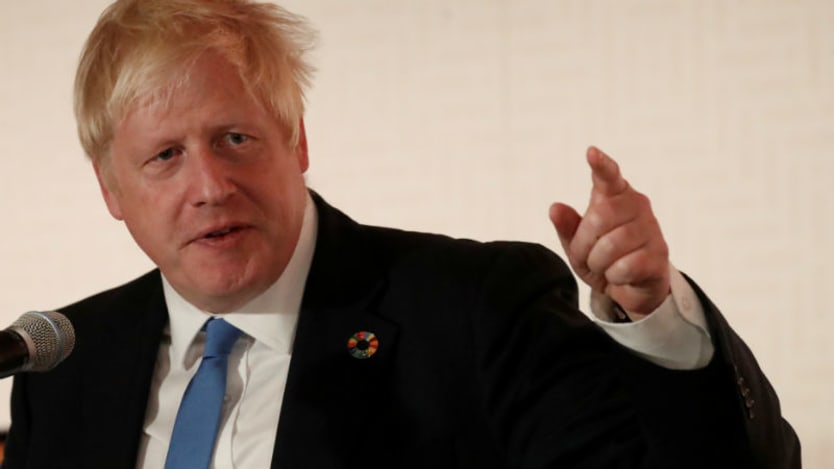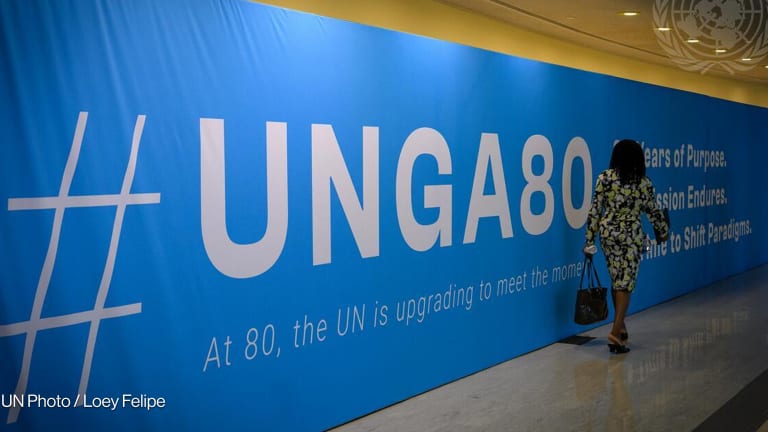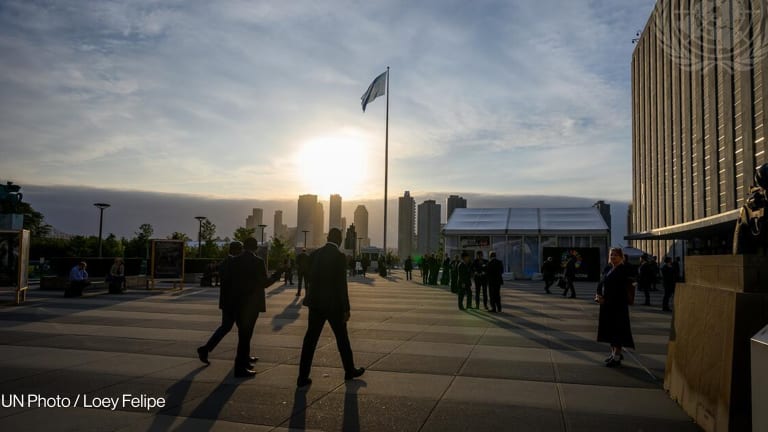
LONDON — The U.K. government announced new climate change and biodiversity funds worth £1.3 billion ($1.6 billion) on Monday — but while aid experts said they welcomed the new environmental focus, they criticized the funds for effectively tying aid and questioned whether it should be coming from the ODA pot.
British Prime Minister Boris Johnson unveiled the three new cross-government funding streams to world leaders at the United Nations General Assembly in New York.
They include a £1 billion fund to support British engineers and scientists to develop “cutting-edge tech” to help low-income countries reduce their carbon emissions; a £220 million International Biodiversity Fund to preserve the world’s endangered species and habitats; and a £100 million Biodiverse Landscapes Fund to protect mangroves and forests.
“You don’t use ODA to save species.”
— Dr. Alison Doig, head of global policy, Christian AidThe funds are part of Johnson’s commitment, also announced at UNGA, to double the U.K.’s international climate finance to £11.6 billion from 2021-2025. The country previously pledged to spend at least £5.8 billion on tackling climate change at the landmark Paris climate meeting in 2015.
Aid actors and climate experts said they welcomed the additional funding for crucial climate and biodiversity issues from the U.K., which has been selected to host the U.N. climate summit next year.
However, they also said the funding should not come out of the aid budget. They called for clarity over where within the budget the money is coming from and how it will be spent.

Activism. UHC. Climate. Read more of Devex's coverage from the 74th U.N. General Assembly.
The announcements of the new aid funds “raise questions about re-allocation of aid money towards UK science and species conservation. This seems like robbing Peter to pay Paul, when in reality new and additional money is needed in the face of the climate emergency,” said Dr. Alison Doig, head of global policy at Christian Aid, in a statement.
“This funding has massive potential but it needs to have a poverty reduction [focus], which is where we are pushing for clarity,” Doig also told Devex.
The £1 billion cross-government Ayrton Fund — which will be jointly administered by the Department for Business, Energy & Industrial Strategy and the Department for International Development — will give money to British organizations working on climate-mitigation technologies, such as renewable energy, clean cookstoves, and electric transport, which can be used in low-income countries
In a press release, Johnson described the fund as an “innovative use of aid money,” and one which “shows how we can use our aid budget to tackle climate change.”
But in a Tweet, Jesse Griffith, head of development finance at the Overseas Development Institute, a London-based think tank, described it as “shockingly bad policy,” and said it breaks the government’s commitment to untie aid.
However, DFID denied that the fund was tied. In an email to Devex, a spokesperson said that “participation in Ayrton-supported projects will not be tied to nationality, and the benefits will be targeted at addressing energy needs in developing countries.”
Mike Wright, director of communications and membership services at Bond, the U.K. network for development NGOs, questioned how much of the Ayrton Fund is new money, and how much is coming from existing aid and climate budgets. “It looks as though the U.K. government is again diverting aid spending away from developing countries and towards the U.K.,” he said.
Doig added that the fund “could be the start of something big,” but said it was important to make sure it supports technologies that “really address the needs of poor communities,” such as off-grid energy solutions, as opposed to supporting “big industrial projects” which have less impact on the poor.
For Pro subscribers: What does the commitment to green UK aid mean in practice?
The U.K. government has committed to spending all U.K. aid in line with the Paris Agreement on climate change, but insiders wonder if it will turn out to be more than a box-ticking exercise.
The framing of the £220 million aid-funded International Biodiversity Fund — which emphasizes saving endangered species such as the black rhino and Sumatran tiger in the press release — was also concerning for Doig and others.
“You don’t use ODA to save species,” she said, adding that “it has to be people and planet, but the announcement seems to put people low down the pecking order, and that’s not aid.”
Within that, £40 million of funding will go to stopping deforestation, according to the press release, in which Zac Goldsmith — the new joint DFID and Defra minister — outlined the links between climate, biodiversity, and poverty.
“As we destroy the world’s forests, we drive ever more species to extinction, we erode nature’s ability to cope with climate change and we undermine the livelihoods of millions of people,” he said. He added that “our contribution through UK aid reflects that, and will help turn the tide on the environmental crisis we face.”
Others also questioned the wisdom of creating three new cross-government aid funds considering the numerous reports and inquiries — including one released Monday by the U.K. parliament’s Public Accounts Committee — that have shown them to be less effective in tackling global poverty and less accountable when compared to DFID.
"These funds should only be managed by departments that can deliver the highest levels of transparency, accountability and impact on poverty,” Oxfam’s Jon Date, head of government relations, said in a statement.
Over the weekend, U.K. development secretary Alok Sharma unveiled further official development assistance for climate in the form of £85 million for a new Risk-Informed Early Action Partnership, designed to help people in low-income countries prepare for and deal with weather-related natural disasters. Speaking at the U.N., Sharma also pledged up to £90 million to the World Bank’s Global Risk Financing Facility, which offers governments and humanitarian groups disaster risk insurance.
Activism. UHC. Climate. Read more of Devex's coverage from the 74th U.N. General Assembly.








